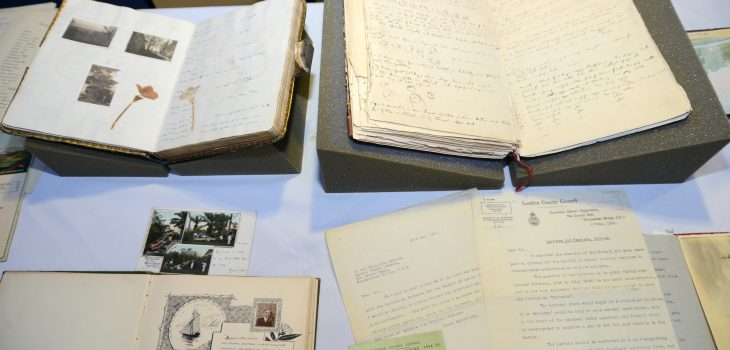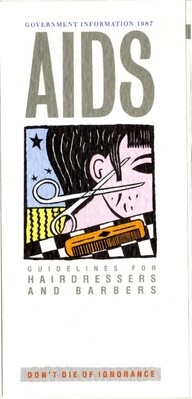Our series of blogs to celebrate 20 years of the LSHTM Archives Service has been postponed over the Summer but we are pleased to announce that the series will continue over the Autumn. We are grateful to our colleague Professor Virginia Berridge for her recollections on how the Archives Service was established.
I came to LSHTM in mid-1988 as Deputy and subsequently Co-Director of the AIDS Social History Programme. This was a major funding initiative from what was then called the Nuffield Provincial Hospitals Trust (now the Nuffield Trust). It studied AIDS policy as ‘history in the making’. Part of that programme consisted of funding for a consultant archivist. We appointed Janet Foster, a well-known health archivist, to the consultancy and she carried out a survey of AIDS archival material which was published as AIDS Archives in the UK.
Janet and I both knew Mary Gibson, a member of the library staff, who was in charge of the Ross archive, which had its home in the library. But we were aware that there was no other archival provision in the School despite the institution’s historic importance within public health at the national and international level.
The Head of the Department of Public Health and Policy, Professor Patrick Vaughan, agreed, via the School, to fund a preliminary archive survey of records within the library and also located in the different departments of the School. This revealed potential riches in terms of archives. In the library there were student registers from 1899 and examination records of candidates for service in the ‘colonies and protectorates’ from 1898-1919 among many other deposits. The Department of Epidemiology and Population Sciences had the papers of Professor George MacDonald, Director of the Ross Institute for Tropical Hygiene. Public Health and Policy had the Sidney Chave papers including his diaries recording the progress of the Harlow New Town survey in the late 1950s and early 1960s relating mental health to environment. The department of Nutrition (the School was differently organised then) had the archives of the Centre for Human Nutrition and a collection of British wartime nutrition booklets and press cuttings from the 1940s.This was only the tip of the iceberg-there were many other collections. None of them had been listed and organised on archival principles.
In consultation with Brian Furner, School librarian, we decided in the early 1990’s to take the matter further by seeking funding from an external source. This was the British Library’s research resources funding which supported the listing of new archival sources. We presented an extensive proposal supported by letters from researchers and others within the School. ‘The archives of the School have not been utilised by historians to the extent that they deserve…because they remain scattered and uncatalogued’ wrote one. ‘The School’s collections are potentially rich sources for scholars but access is at present more than difficult’ said another. We asked for £70,000 for an archivist to list department by department the collections which had been revealed by the initial survey Our application was unsuccessful. The British Library reviewers wanted to ensure that the collections would be properly deposited in a funded archive at the end of their funding. That was not on the cards for the School at the time.
In the aftermath, the decision was taken to transfer some collections to the Wellcome Library just down the road – the Sidney Chave archive and the Nutrition collection among them. But we did not lose sight of the ultimate objective. The new Director of the School, Andy Haines, developed a ‘new blood’ scheme to insert some new academic posts into the School. There was a School wide competition. Posts were proposed and then there was a School vote. Two posts were on offer and would be funded if they came top of the poll. I hastily rewrote our proposal with input from Brian and it went into the competition. Voting numbers were reasonable but we only came sixth – so no hope of funding. Then, overnight, things changed. Several proposals in the competition dropped out for different reasons. Some proposers had obtained funding elsewhere and some left the School. Suddenly our proposal was top of the list! We were funded along with an associate professorship in health policy.
A condition of the ‘new blood’ money was that, after a period of School funding, external funds had to be obtained to continue or expand the post. This was less problematic for the archival work than it might have seemed. By then, 20 years ago, the British Library archival fund had transferred to Wellcome to run as a joint enterprise. The existence of a proper archive with a funded archivist, Victorian Cranna, who had been appointed to the post, satisfactorily dealt with the issues which had led our previous application to fail. Funding came on stream for a re-cataloguing of the Ross archive in 2003, the first of many such successful applications Victoria Cranna has made since. The Nutrition archive returned to the School.
Virginia Berridge, Professor of History and Health Policy
We would like to add that we are extremely grateful for Professor Berridge’s hard work and enthusiasm in establishing the Archives Service and her continued support over the last 20 years. The AIDS Social History Programme collection and the Berridge Collection are able to view on our catalogue and are a wonderful resource for researchers interested in the history of HIV and AIDS. For further information, please contact the Archives Service.










